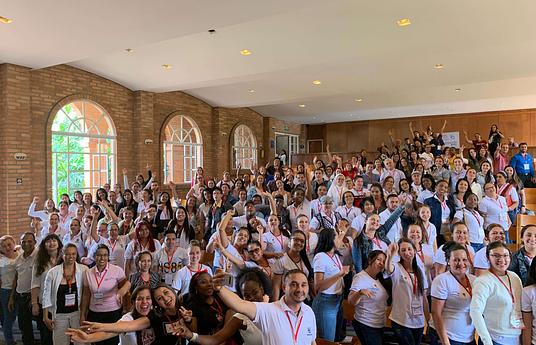In honour of Human Rights Day today, Henry May, co-founder & CEO of HundrED 2020 innovation Co-School shares the inspiring work they are doing to support and protect the rights of all humans. Read more to find out how!
Human Rights under the microscope in Latin America
It is December 2019. The streets of Bogotá (and other Latin American cities) are alive with the sound of protests. Hundreds of thousands of people have been marching across the continent in recent months to protest against those that Govern them. At the center of many of the Protests, the claims of the Protestors point towards ongoing Human Rights’ abuses (in Colombia, to name but a few; police brutality, forced displacement of indigenous groups, and gender discrimination).
Dilan Cruz, an 18 year old high school student, joined the protests on November 23rd like many of his peers, to argue for his right to free higher education. He could easily have been a participant in one of our projects in Coschool. He was shot in the head by a tear gas canister from 10 meters by a riot police officer (part of the infamous ESMAD) and died, in hospital, 36 hours later.

Internal reflections
Human Rights’ day on December 10th has given us a chance, in Coschool, to re-sharpen our focus on what we do, in the light of the current tensions we are experiencing in Colombia. We are in the business of developing social & emotional skills in youth and teachers across the education system. Our programs aim to provide tools and create environments where humans take care of each other. Increasing empathy, collaboration, conflict resolution, and ethical decision-making lie at the core of our work. Today, those skills seem to be missing from those in power.
Defined by the UN as the rights inherent to all human beings, regardless of race, sex, nationality, ethnicity, language, religion, or any other status. Human rights include the right to life and liberty, freedom from slavery and torture, freedom of opinion and expression, the right to work and education, and many more, everyone is entitled to these rights, without discrimination. In countries and communities where there are acutely unfair distributions of power, the human rights of the vulnerable, the poor, the less powerful must be closely protected. Colombia ranks as the 4th most inequal country in the world, an astonishing statistic when it also the 38th richest according to its GDP; and as that disparity implies, this is a country rife with Human Rights’ violations.

What might be done?
Protests have worked in the past to move society forward on key humans rights issues (famous examples: the Suffragettes and the American civil rights movements.) Today, protests can quickly go viral and spread across borders, leaving politicians with nowhere to hide. Take the Chilean feminists’ anthem “A Rapist in your path” – a protest song rippling across Latin American and demanding women are treated fairly. Thanks to the connected age we live in, social media could result in a faster spread of international demonstrations, more pressure on politicians, and faster policy changes.
However, I don’t believe Coschool’s role is to be out on the streets protesting. I’ve told my team that. Some of them are also angry, but I’ve reminded them of the privileged position we find ourselves in at the moment, and of the responsibility we have as innovators in the education sector here.

For us, the inclusion (and centrality) of social & emotional learning in Colombia, Latin American, and global schools is now non-negotiable. What should that look like in practice?
-
Training of teachers and school leaders on social & emotional skills. On what they are, on how to understand and develop their own skills, and how to build schools and classrooms where these skills flourish.
-
A curriculum that includes narratives of virtue, ethics, and human rights. We cannot take for granted that children will learn what is right from wrong through their social media feeds or at homes. As educators, we have a right to ensure children are provided an education in morality.
-
The urgency is not just in public, low-income schools. Private schools (particularly in more vulnerable and unequal countries like Colombia), are going to provide a disproportionate number of future leaders to society. Character & socioemotional education is just as urgently required, despite parents’ clamor for academic achievement.
We recently finished our annual “RETO B” program for teenagers in three locations, including Medellin, for the first time. Forty 16-18 year old’s came together from 5 different neighborhoods to work together on solving social & environmental problems.
To that end, our contribution to the protests is to keep doing what we’re doing: building the skills of collaboration for Colombians that will, we hope, ensure different approaches to human rights issues in the future. To ensure less cases like Dilan Cruz. You can join in with our conversation on social media with our #habilidadesparacolombia (skills for Colombia).
To learn more about Coschool and their work, visit their innovation page here.

